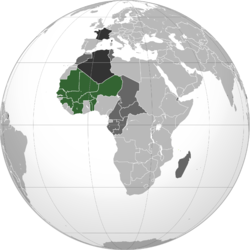French West Africa
| French West Africa | |||||
| Afrique occidentale française | |||||
| Federation of French colonies | |||||
|
|||||
|
French West Africa after World War II
Green: French West Africa Dark grey: Other French possessions Darkest grey: French Republic |
|||||
| Capital |
Saint Louis (1895–1902) Dakar (1902–1960) |
||||
| Languages |
French (official) Arabic, Fula, Songhay, Hausa, Mossi, Mandinka, Wolof, Bambara Berber languages, Mande languages widely spoken |
||||
| Political structure | Federation | ||||
| Historical era | New Imperialism | ||||
| • | Established | 27 October 1895 | |||
| • | Fifth Republic | 5 October 1958 | |||
| Currency | French West African franc | ||||
| Today part of |
|
||||
French West Africa (French: Afrique occidentale française, AOF) was a federation of eight French colonial territories in Africa: Mauritania, Senegal, French Sudan (now Mali), French Guinea, Ivory Coast, Upper Volta (now Burkina Faso), Dahomey (now Benin) and Niger. The capital of the federation was Dakar. The federation existed from 1895 until 1960.
Until after the Second World War almost all the Africans living in the colonies of France were not citizens of France. Rather, they were "French Subjects", lacking rights before the law, property ownership rights, rights to travel, dissent, or vote. The exception were the Four Communes of Senegal: those areas had been towns of the tiny Senegal Colony in 1848 when, at the abolition of slavery by the French Second Republic, all residents of France were granted equal political rights. Anyone able to prove they were born in these towns was legally French. They could vote in parliamentary elections, which had been previously dominated by white and Métis residents of Senegal.
The Four Communes of Senegal were entitled to elect a Deputy to represent them in the French Parliament in the years 1848–1852, 1871–1876, and 1879–1940. In 1914, the first African, Blaise Diagne, was elected as the Deputy for Senegal in the French Parliament. In 1916, Diagne pushed through the National Assembly a law (Loi Blaise Diagne) granting full citizenship to all residents of the so-called Four Communes. In return, he had promised to help recruit millions of Africans to fight in World War I. Thereafter, all black Africans of Dakar, Gorée, Saint-Louis, and Rufisque could vote to send a representative to the French National Assembly.
...
Wikipedia


